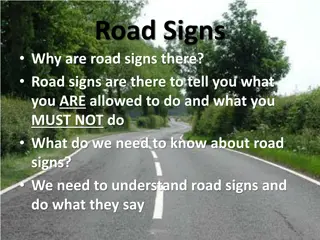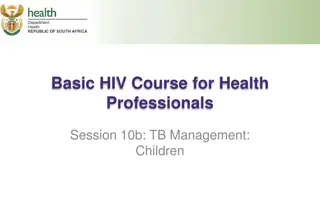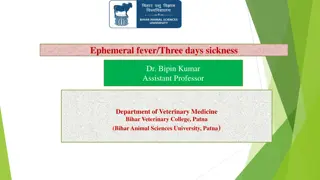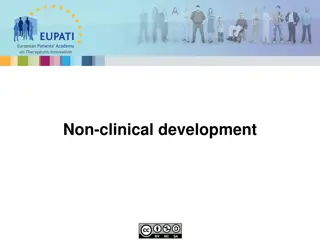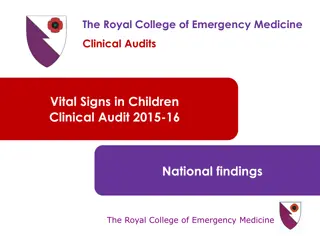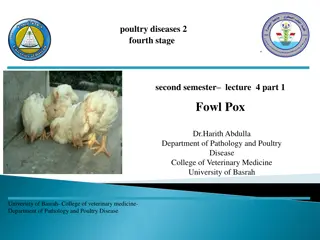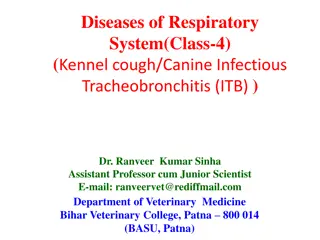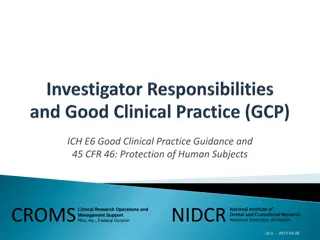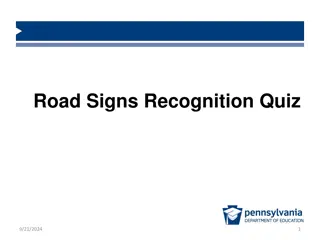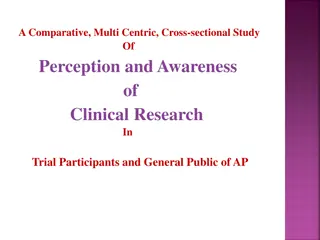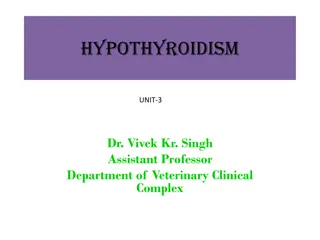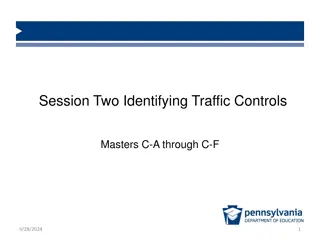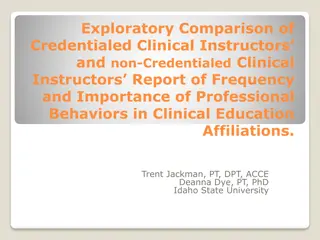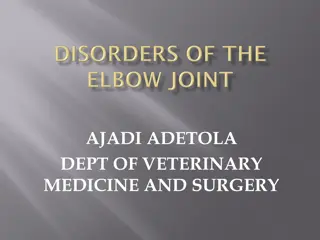India Alliance Clinical & Public Health fellowship in India
India Alliance Clinical & Public Health fellowship in India\n\nIndia Alliance Clinical and Public Health Research Fellowships are for Health researchers with an MD, MS, MPH, or an equivalent clinical or public health degree, who can apply for the DBT\/Wellcome Trust India Alliance Clinical and Publi
0 views • 5 slides
Understanding Road Signs and Safety Measures
Road signs are essential for providing guidance and ensuring road safety. They convey important information about regulations, warnings, and directions to motorists and pedestrians. Understanding the meanings of various road signs is crucial in navigating roads safely. This guide explores different
0 views • 6 slides
Ethical Issues in Clinical Pharmacy Research by Dr. Haider Raheem Mohammad
Research ethics play a crucial role in clinical trials and therapeutic research in the field of pharmacy. From discovery to validation, all medicines undergo rigorous evaluation processes to ensure safety, efficacy, and freedom from adverse effects. Clinical trials in both animals and humans are ess
0 views • 20 slides
Road Traffic Signs and Markings Overview
Understanding road traffic signs and markings is crucial for safe driving. From Give Way signs to double solid lines, each element serves a specific purpose to regulate traffic flow and ensure road safety. This comprehensive guide breaks down the meaning and importance of various road markings such
0 views • 15 slides
TB Management in Children: Diagnosis and Signs
This session covers essential aspects of diagnosing and managing Tuberculosis (TB) in children. Participants will learn about the signs and symptoms of TB, diagnostic methods, management strategies, and the importance of accurate reporting. Key topics include history of exposure, clinical presentati
0 views • 58 slides
Understanding Structural Linguistics: An Exploration of Language and Signs
Delve into the intricate world of structural linguistics through an in-depth analysis of language components, linguistic signs, and the relationship between language and linguistics. Explore the concepts of syntagmatic vs. paradigmatic relations, linguistic signs as associations of sound and meaning
4 views • 62 slides
Advanced Clinical Practice Framework and Pillars of Practice
The document discusses the advanced clinical practice framework and the four pillars of practice which include leadership & management, clinical practice, education, and research. It emphasizes the importance of core capabilities and area-specific competence in advanced clinical practice. The role o
2 views • 8 slides
Objective Structured Clinical Examination (OSCE): A Modern Approach to Assessing Clinical Competence
The Objective Structured Clinical Examination (OSCE) is a modern examination method widely used in the field of health science to evaluate clinical skill performance. It involves stations where medical students interact with simulated patients to demonstrate competencies such as history taking, phys
1 views • 40 slides
Understanding Elder Abuse and Its Signs
Elder abuse can take various forms such as physical, psychological, financial, sexual abuse, and neglect, causing harm and distress to older individuals. Recognizing the signs of elder abuse is crucial to protecting vulnerable seniors in our communities. Signs can include physical injuries, unexplai
0 views • 9 slides
NIMH Clinical Research Education and Monitoring Program Overview
NIMH's Clinical Monitoring and Clinical Research Education, Support, and Training Program (CREST) aims to ensure the proper conduct, recording, and reporting of clinical trials. This program includes clinical monitoring plans, guidelines for site monitoring activities, and independent clinical monit
1 views • 29 slides
Understanding Ephemeral Fever/Three-Day Sickness in Cattle and Water Buffalo
Ephemeral fever (Three-Day Sickness) is an acute arthropod-borne viral disease affecting cattle and water buffalo. It is caused by the Bovine Ephemeral Fever Virus and manifests with biphasic fever, decreased milk yield, and other clinical signs. The disease has varying prevalence and can lead to hi
0 views • 7 slides
Understanding Non-Clinical Development in Therapeutic Innovation
The European Patients Academy on Therapeutic Innovation focuses on the non-clinical development phase of medicine, delving into efficacy assessment, safety evaluation, and manufacturing process considerations. Non-clinical studies are essential for decision-making in clinical trials, marketing appli
1 views • 26 slides
Understanding Fowl Typhoid: Causes, Transmission, Clinical Signs, and Control Measures
Fowl typhoid, caused by Salmonella gallinarum, affects adult chickens with high mortality rates. It spreads through infected droppings, carcasses, and fomites. Clinical signs include listlessness, diarrhea, and organ swelling. Diagnosis involves isolation and identification, while treatment options
0 views • 4 slides
National Findings on Children's Vital Signs in Emergency Medicine
This clinical audit by The Royal College of Emergency Medicine in 2015-16 focused on assessing emergency departments' performance against clinical standards related to vital signs in children. The audit objective was to identify current performance levels and facilitate quality improvement. The stan
0 views • 21 slides
Understanding Carbamate Insecticides: Classification, Mechanism of Action, Clinical Signs, and Treatment
Carbamate insecticides are widely used in agricultural and veterinary practices due to their broad-spectrum activity and low mammalian toxicity. This chapter discusses the classification, similarities with organophosphate compounds, differences, mechanism of action, clinical signs, diagnosis, and tr
1 views • 13 slides
Understanding Signs, System, and Semiotics According to Saussure
Saussure's concept of sign value emphasizes the importance of relationships within a system, where a sign's meaning is not absolute but dependent on its interactions with other signs. He highlights the distinction between signification and value, showcasing how signs derive their value from the syst
0 views • 10 slides
Understanding Signs, Systems, and Semiotics in Linguistics
Saussure's theory of signs emphasizes the relationship between a signifier and a signified, highlighting the importance of belonging to a system of differences. Signs, as interpreted meaningful entities, play a crucial role in semiotics, shaping our understanding and communication. The concept of si
0 views • 11 slides
Anemia in Swine: Causes, Clinical Signs, and Treatment
Anemia in swine can be caused by factors such as gastric ulcers, internal bleeding, and poor nutrition. Clinical signs include pale skin, rapid breathing, and jaundice. Piglet anemia, a highly fatal disease, is marked by decreased hemoglobin levels and liver degeneration. Diagnosis involves examinin
0 views • 11 slides
Understanding Evidence-Based Medicine and Clinical Decision-Making
European Patients Academy on Therapeutic Innovation emphasizes the importance of Evidence-Based Medicine (EBM) in providing optimum clinical care. EBM involves systematic review and utilization of clinical research for informed decision-making, benefiting patients in disease management and treatment
7 views • 20 slides
Understanding Azoturia in Horses: Causes, Symptoms, and Treatment
Azoturia, also known as exertional rhabdomyolysis or tying-up syndrome, is a multifactorial myopathy that mainly affects draft horses. It is characterized by stiffness in gait, reluctance to move, lameness, and myoglobinuria. The disease typically occurs during exercise after a period of rest and ca
0 views • 14 slides
Essential Aspects of the Clinical Interview in Psychology
Clinical interviews play a crucial role in the assessment conducted by clinical psychologists, showcasing essential qualities like validity, reliability, and clinical utility. Understanding the importance of feedback and honing general and specific skills as an interviewer are key components in cond
1 views • 17 slides
Understanding Rodenticides: Types, Effects, and Treatment
Rodenticides are chemical preparations used for rodent control, primarily targeting mice and rats. They play a crucial role in managing rodent populations to prevent associated losses. The chapter covers an introduction to rodenticides, their classification into organic and inorganic types, mechanis
0 views • 19 slides
Understanding Fowl Pox in Avian Species: Causes, Symptoms, and Diagnosis
Fowl Pox, caused by Avipoxvirus, is a contagious disease in birds characterized by wart-like nodules and diphtheritic membranes in the throat and mouth. It has multiple forms, including dry pox, wet pox, and coryza-like form, with varying clinical signs. The disease spreads through mosquitoes, bitin
1 views • 10 slides
Kennel Cough: Contagious Canine Respiratory Disease Overview
Kennel Cough, known as Canine Infectious Tracheobronchitis, is a highly contagious respiratory disease affecting dogs, characterized by acute tracheobronchitis and a paroxysmal cough lasting several days. It is caused by various infectious agents, including Canine Parainfluenza Virus and Bordetella
0 views • 12 slides
Proposal for Play Area Signage Improvement
Playground inspection reports highlighted the need for signage improvements in play areas across the parish. Tony has researched guidelines and proposed a set of possible signs with cost estimates from Wicksteed. The options include various sign types and sizes, with two signs suggested for each pla
0 views • 15 slides
Clinical Research Guidelines and Regulations Overview
Clinical research encompasses various guidelines and regulations to ensure the protection of human subjects and the credibility of study results. Key aspects include Good Clinical Practice (GCP) standards, Title 45 of the Code of Federal Regulations (CFR) Part 46, and additional CFR sections for cli
0 views • 46 slides
Recognizing Signs of Child Abuse and Preventing Harm
Children often exhibit signs of abuse through changes in behavior, and it is important for adults to be vigilant and proactive in identifying and addressing these signs. This includes watching for inappropriate behaviors, nightmares, withdrawal, secretive behavior, sudden personality changes, and mo
0 views • 28 slides
Ohio Clinical Alliance: Transforming Clinical Experiences
The Ohio Clinical Alliance, through collaborative partnerships, aims to enhance clinical preparation for educators. The leadership team comprises various representatives and organizations committed to improving student learning. Their activities include retreats and meetings to ensure effective comm
0 views • 27 slides
Understanding Selenium Toxicity in Animals: Sources, Mechanism, and Clinical Signs
Selenium toxicity in animals can occur through various sources such as selenium-containing plants. The toxicokinetics involve absorption from the gut and distribution to different body parts. The mechanism of toxicity is linked to the incorporation of selenium in amino acids and proteins, leading to
0 views • 10 slides
Road Signs Recognition Quiz - Test Your Knowledge of Traffic Signs
Get ready to test your knowledge of road signs with this quiz! Each sign will flash for 0.3 seconds, and you will have 10 seconds to write down its meaning. Challenge yourself and see how well you can identify different traffic signs.
0 views • 117 slides
Understanding Neurology: Localization, Neuroaxis Structures, and Motor Neuron Signs
Explore the intricate world of neurology with a focus on brain localization, neuroaxis structures, and the distinctions between upper and lower motor neuron signs. Delve into the functions of brain lobes, brain stem anatomy, and spinal cord functions. Discover how upper motor neuron signs indicate l
0 views • 52 slides
Perception and Awareness of Clinical Research in Trial Participants and the Public of Andhra Pradesh
This study focuses on understanding the perception and awareness of clinical research among trial participants and the general public in Andhra Pradesh. It highlights the importance of creating awareness about clinical research, previous study results, public attitudes towards clinical trials, and e
0 views • 24 slides
Hypothyroidism in Dogs: Causes, Clinical Signs, and Diagnosis
Hypothyroidism in dogs is an endocrine disorder characterized by reduced secretion of thyroid hormones, leading to a range of clinical signs such as lethargy, weight gain, and hair loss. Common in medium to large breeds, this condition can result from primary thyroid dysfunction or pituitary-depende
0 views • 11 slides
Identifying Traffic Controls: Regulatory, Warning, Guide Signs & More
This presentation covers the identification of various traffic controls including regulatory signs, warning signs, guide signs, traffic light signals, lane markings, and pavement markings. The objectives include recognizing signs based on color, shape, and symbols, understanding traffic light signal
0 views • 8 slides
Understanding Psychopathology: Symptoms and Signs in Psychiatry
Psychopathology involves the study of symptoms and signs in psychiatry, where signs are objective observations and symptoms are subjective experiences. Mental disorders encompass a range of issues affecting thoughts, emotions, behaviors, and relationships. Recognizing signs and symptoms such as slee
0 views • 31 slides
Comparison of Professional Behaviors in Clinical Education
Professional behavior characteristics play a crucial role in enhancing student learning during clinical education. This study examines the differences in reported importance and frequency of professional behaviors between credentialed and non-credentialed clinical instructors. The background outline
0 views • 28 slides
Understanding Elbow Joint Disorders in Veterinary Medicine
The elbow joint is a true diathrodial joint formed by the articulation of various structures. Disorders such as elbow luxation, un-united anconeal process, and fragmented coronoid process can lead to lameness and other clinical signs in animals. Causes include osteochondritis dissecans and trauma, w
0 views • 16 slides
Enhancing Clinical Academic Collaboration Between Universities and NHS Trusts
Clinical academics play a crucial role in integrating clinical practice, research, and education within the NHS. Collaboration between universities and NHS trusts is key to ensure clinical academics address the right questions for patient care and societal benefit. Challenges include an aging clinic
0 views • 29 slides
The Principle of Arbitrariness in Linguistic Signs: Saussure's Insight
Saussure's declaration on the arbitrariness of linguistic signs is thought-provoking, emphasizing that while signs are arbitrary, complete arbitrariness would lead to chaos. He distinguishes between degrees of arbitrariness and acknowledges that signs are not entirely arbitrary, being subject to lin
0 views • 9 slides
Understanding Clinical Trials: Phases, Types, and Definitions
Clinical trials play a crucial role in advancing medical research and treatment options. This comprehensive guide covers the basics of clinical trials, including their definition, phases, types, and key definitions like IND, IDE, NDA, and more. Discover how different phases of trials work, the vario
0 views • 16 slides

